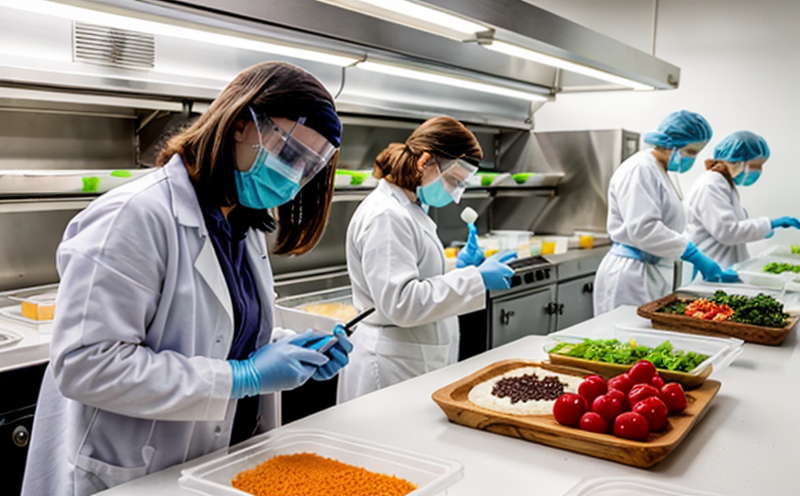ISO 22965 Bacillus cereus Detection and Enumeration Testing
The ISO 22965 standard provides a robust framework for the detection and enumeration of Bacillus cereus, an important foodborne pathogen known for its ability to cause vomiting in humans. This bacterium is particularly prevalent in foods that are high in protein, such as dairy products, meat, poultry, and rice dishes.
Understanding the presence of Bacillus cereus in your product or process is critical because it can lead to significant health risks for consumers. The standard outlines comprehensive protocols designed to minimize contamination during production, storage, and distribution. By adhering to these guidelines, food manufacturers can ensure compliance with international standards and safeguard public health.
The test involves several key steps including sample collection, preparation, inoculation into appropriate media, incubation, and subsequent enumeration of colonies that appear indicative of Bacillus cereus. The process is meticulous and requires precise handling to avoid false positives or negatives. Laboratories specializing in this service must be equipped with the latest technologies and trained personnel to perform these tasks accurately.
Compliance with ISO 22965 not only ensures regulatory adherence but also enhances brand reputation by demonstrating a commitment to quality and safety. This is particularly important for companies operating internationally, where local regulations often align closely with international standards like ISO.
In addition to detecting the presence of Bacillus cereus, this service can help identify potential sources of contamination within your production facility. By pinpointing these areas, you can implement targeted corrective measures that prevent future outbreaks and protect both your brand and consumers from harm.
The importance of accurate detection cannot be overstated. False negatives could lead to undetected contamination, while false positives may result in unnecessary recalls or disruptions in the supply chain. Therefore, it is crucial to partner with a laboratory capable of delivering reliable results consistently.
Understanding the intricacies of ISO 22965 helps ensure that your food products meet stringent safety standards. By leveraging this expertise, you can gain confidence in the quality and integrity of your offerings, thereby fostering trust among consumers and stakeholders alike.
Scope and Methodology
| Step | Description |
|---|---|
| Sample Collection | Proper collection of samples from the production process or storage areas. |
| Preparation | Preliminary steps to prepare samples for inoculation, ensuring accuracy and consistency. |
| Inoculation into Media | Introduction of the sample onto specialized media designed to facilitate growth of Bacillus cereus. |
| Incubation | Providing optimal conditions for bacterial colonies to develop, which can then be counted. |
| Enumeration | Careful counting and identification of colonies that represent Bacillus cereus. |
The methodology described in ISO 22965 ensures that all steps are carried out under controlled conditions to achieve accurate results. Each step is critical, as any deviation could impact the final outcome significantly.
Why Choose This Test
Detecting and enumerating Bacillus cereus using ISO 22965 is essential for maintaining high standards of food safety. Here are some compelling reasons why you should consider this testing service:
Compliance with International Standards: Adherence to international standards like ISO ensures that your products meet the highest quality benchmarks.
Risk Management: Early detection allows for timely intervention, reducing the risk of contamination and associated health hazards.
Consumer Trust: Demonstrating a commitment to safety through rigorous testing builds consumer confidence in your brand.
Supply Chain Integrity: Ensuring that all components in your supply chain meet these stringent standards protects against potential disruptions.
Regulatory Compliance: Many countries have regulations requiring compliance with specific food microbiology standards, making this test crucial for global operations.
Data-Driven Decisions: Accurate data helps inform strategic decisions regarding process improvements and quality enhancements.
In summary, choosing ISO 22965 testing provides peace of mind knowing that your products are safe and compliant with the latest international standards. This service is a cornerstone in maintaining robust food safety practices throughout the industry.
International Acceptance and Recognition
The ISO 22965 standard for Bacillus cereus detection has gained widespread recognition across numerous countries due to its rigorous approach and comprehensive guidelines. Many regulatory bodies worldwide have adopted it as a benchmark for food microbiology testing.
In the United States, the Food Safety Modernization Act (FSMA) encourages use of internationally recognized standards like ISO 22965 in ensuring the safety of imported foods. Similarly, countries within Europe often align their national standards with those prescribed by ISO to maintain consistency and harmonization across borders.
Across Asia, Australia, Canada, and other regions, adherence to such standards is seen as a mark of excellence in food production practices. Laboratories that offer this service are typically certified under relevant accreditation schemes, further enhancing credibility and reliability.
The global nature of the food industry means that compliance with international standards like ISO 22965 can open doors for exporters looking to penetrate new markets or expand existing ones. It signals a commitment to quality and safety at every stage of production, from raw materials to final product.
Moreover, certification under these standards often translates into lower insurance premiums and reduced liability risks, making it an attractive proposition for food manufacturers globally.





